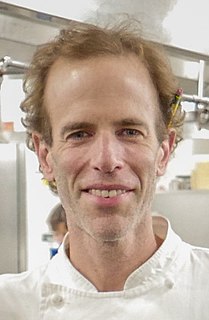Top 23 Quotes & Sayings by Dan Barber
Explore popular quotes and sayings by an American chef Dan Barber.
Last updated on April 19, 2025.
At the end of the day, yes. It's all about the marbling and maybe a few other things along the way. But intramuscular fat, that's where you get a lot of flavor. Fat carries the flavor but in the last 50 years it's been bred out of pigs. When American chicken exploded in the 70's and became such a huge commodity, it took away pork sales. The pork industry suffered and had to change.
























